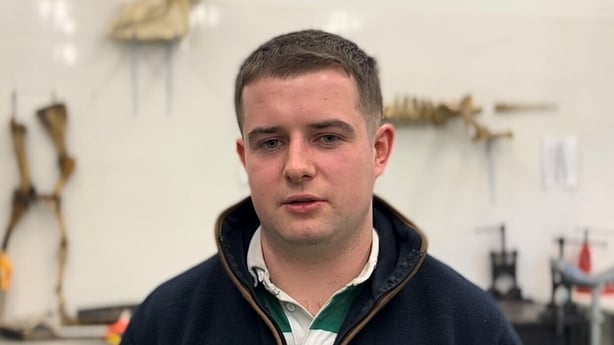Gregory Phelan from Tullow in Co Carlow had hoped to study veterinary medicine at University College Dublin.
Instead, four years ago he packed his bags for Poland and is now one of 208 Irish students enrolled in the veterinary medicine master's programme at the Warsaw University of Life Sciences.
The course is taught in English and Irish vet students currently account for almost 60% of the faculty’s student body.
"We get to be exposed to the same level of teaching and information that we would at home," said Gregory, before his class started to conduct x-ray scans of a horse at the university’s equine clinic.
"Farming methods in Eastern Europe are different, sometimes on a larger scale, sometimes on a much smaller scale than you would see at home. But you’re still learning the same type of stuff, just from a different perspective," he added.

The number of Irish vet students at the Warsaw university (the Polish acronym is SGGW) has continued to increase year-on-year since its first Irish vet graduated in 2013.
Another 78 Irish vet students are currently enrolled at the Wrocław University of Environment and Life Sciences in southwestern Poland, bringing the total number of Irish vet students in Poland to almost 300.
There are 50 first-year students enrolled in the Wrocław course. Thirty-five of them are Irish.
Universities in Hungary also attract a smaller number of Irish vet students.
There are jobs for vets in Ireland.
As of 3 February, Veterinary Journal Ireland advertised 65 vacancies in the Republic and 12 in Northern Ireland.
This may not include all vet vacancies on the island.
We need your consent to load this rte-player contentWe use rte-player to manage extra content that can set cookies on your device and collect data about your activity. Please review their details and accept them to load the content.Manage Preferences
So why are so many Irish vet students enrolling in central and eastern European universities?
There are three main reasons. First, the scarcity of university places in Ireland.
The UCD School of Veterinary Medicine is the only one of its kind in Ireland and places are limited to approximately 80 each year.
That number of graduates is too small to meet the current level of demand for vets, particularly in rural areas.
Secondly, the bar for entry to the course in UCD is very high.
Students hoping to gain entry to the course at Belfield last September needed to attain 601 points in the Leaving Certificate.
The application processes at the two universities in Warsaw and Wrocław take practical experience into account during application interviews.
Thirdly, cost.
Tuition fees for the master's programme in Warsaw cost €8,400. In Wrocław, it is approximately €7,500.
That is much higher than the cost of student contribution fees in Ireland, which are capped at €3,000.
(Tuition fees for Polish and other EU students studying in Poland are free. However, due to the fact that the two vet courses are taught in English and not through Polish, the official language of the Polish state, the two universities offer the programmes as special courses and charge tuition fees as an exception.).
However, the cost of living in Poland for students is much cheaper than in Ireland.
Students can expect to pay approximately €150 to €180 per month to live in dormitories on campus where the cost of heating is included.

"The cost of living here is just way cheaper than at home and it's more sustainable," says Lucy Buckley Keane from Fermoy in Co Cork, a first-year student at the Wrocław University of Environment and Life Sciences.
Homesickness causes a small number of Irish vet students in Warsaw to opt out each year.
But overall, they have built a tight-knit community that supports each other when living far from home.
The large number of Irish students in Warsaw means that Cumann Warszawa, the GAA club founded by the first cohort of Irish vets over a decade ago, now fields two men’s teams and two ladies’ teams in regional competitions.
So, will studying abroad become the norm for Irish vets?
The Department of Further and Higher Education told RTÉ News that: "There is a process under way of assessing expressions of interest from higher education institutions to expand capacity in a number of areas including veterinary."
Minister Simon Harris is due to receive proposals on the matter this month.
The establishment of a new school of veterinary medicine in Ireland will likely be too late for Gregory and his classmates.
But he has no regrets about studying abroad.
"After spending four years here, you get to meet people from all over the world that you probably wouldn’t have met in Dublin," he said.







